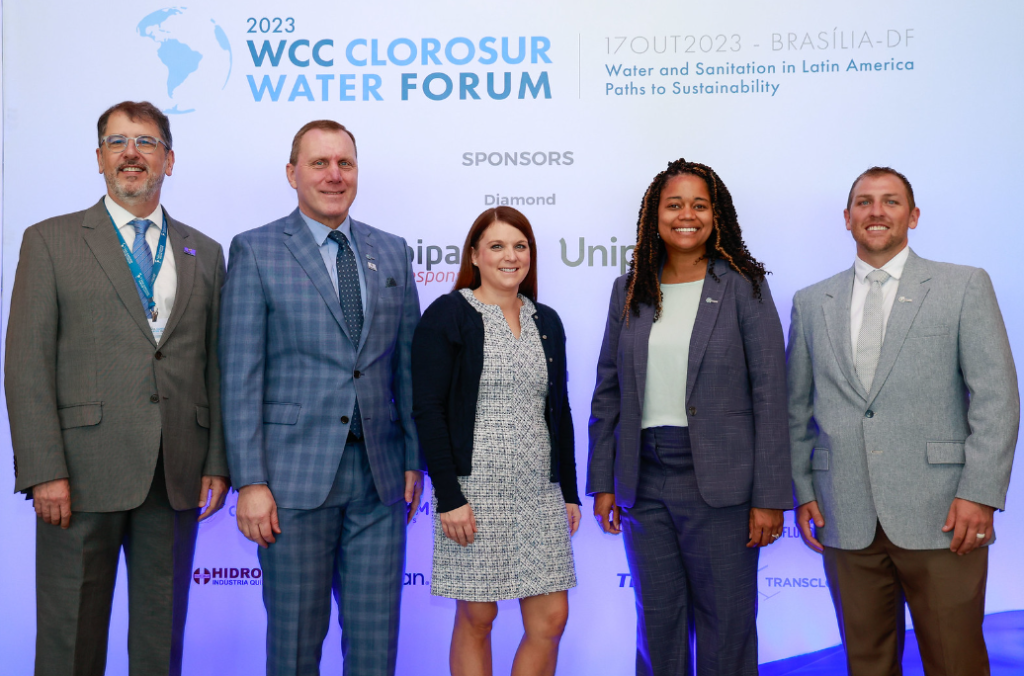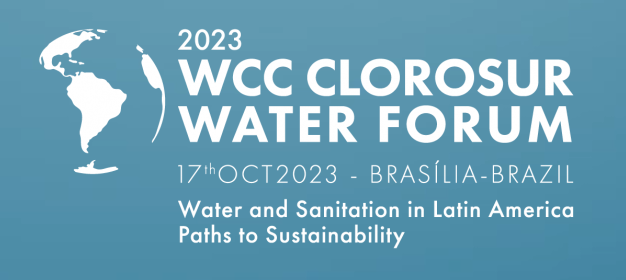Receive Email Updates
The World Chlorine Council (WCC) is pleased to announce its annual safety webinar so save the date today! This 90-minute online event on 18 November 2024 from 13:00 – 14:30 CET via Teams will focus on key safety practices critical to the global chlorine industry.
Whether you are involved in chlorine production, transport, handling, or play a supporting role in ensuring safety at your organisation, this webinar will provide valuable insights and practical advice. Attendees will have the opportunity to learn from experts in the field, with topics covering best practices for the safe handling and transport of chlor-alkali products, the importance of cognitive readiness for safety, and issues related to chlorine hydrates and their prevention.
This session is an excellent opportunity to stay updated on the latest safety protocols and advancements while connecting with professionals from around the world. The final agenda, featuring expert speakers, will be shared soon.
To register and for further information, please reach out to Thomas Vanfleteren. We look forward to seeing you there!
As global public health challenges evolve, chlorine-based disinfectants play an essential role in controlling the spread of infectious diseases. Chlorine bleach, a widely used disinfectant, has long been recognized for its effectiveness against a wide range of pathogens, including bacteria and viruses. During the ongoing Mpox (formerly known as Monkeypox) outbreak, caused by human-to-human transmission of the Mpox virus, bleach continues to be an important tool in disinfection efforts, particularly for high-contact surfaces1.
According to the CDC, Center for Disease Control in the USA, Mpox can survive on fabrics, linens, and environmental surfaces. The CDC recommends laundering contaminated fabrics in a standard washing machine using detergent, without the need for additional sanitizers. For hard surfaces, a bleach solution can be highly effective. A bleach solution can be prepared by mixing 100 milliliters of approximately 6% bleach with 1 liter of water, allowing it to remain on surfaces for at least one minute to inactivate the virus. This aligns with the procedures recommended for other viruses, such as SARS-CoV-2, where bleach was similarly used to disinfect contaminated surfaces12.
In August 2024, the CDC issued a Health Alert Network update concerning the ongoing Mpox outbreak in the Democratic Republic of the Congo and neighbouring countries. In response, the EPA reactivated its Emerging Viral Pathogen (EVP) guidance for Mpox, which will remain effective until August 2026. This allows products registered under the EVP guidance to be used to help contain the virus, highlighting the critical role chlorine-based disinfectants play in mitigating the spread of emerging pathogens34.
The World Chlorine Council remains committed to promoting the use of chlorine bleach and other disinfectants as essential tools in public health. We encourage the public to follow the latest guidelines from the CDC and the U.S. Environmental Protection Agency (EPA), ensuring that disinfection practices align with the most up-to-date recommendations4.
Contributions of the Chlor-Alkali and Derivatives Industry to the Sustainable Development Goals (SDGs)
In June 2021, the Brazilian Chlor-Alkali and Derivatives Industry Association (Abiclor), in partnership with the São Paulo State Environmental Company (Cetesb), reinforced its commitment to the Sustainable Development Goals (SDGs), established by the UN, by signing the Protocol of Intentions with the environmental agency. Since then, Abiclor member companies that have agreed to the protocol have actively participated in training courses that have resulted in the identification of five key SDGs, crucial to the sustainability of the sector:
Clean Water and Sanitation (SDG 6)
Affordable and Clean Energy (SDG 7)
Decent Work and Economic Growth (SDG 8)
Sustainable Consumption and Production (SDG 12)
Climate Action (SDG 13)
Currently, the sector’s consenting companies have already achieved 69% adherence to the proposed goals, which clearly demonstrates a tangible commitment to sustainability.
Abiclor recognizes that there is room for opportunity in the process of progress and continuous improvement. Therefore, the association will incorporate initiatives in the coming years to further boost sustainability throughout the production chain.
In addition, Abiclor has scheduled a full agenda of meetings to share best practices and continue advancing on this journey.
Protocol Expansion: By February 2024, a diagnosis was prepared for companies that wish to join the group as signatories.
Group Meetings: Bi-monthly meetings are held to discuss Abiclor’s criteria on the topics identified in the protocol (5 goals), as well as exchange information for joint progress.
Internal Best Practices: Release of bi-monthly newsletters featuring best practices aligned with the target SDGs.
Abiclor reiterates its commitment to sustainability and invites all companies in the chlorine-alkali sector to join this important initiative, contributing to a more sustainable future for all.
Chlorine is essential for maintaining pool and water safety, ensuring our summer activities are safe and enjoyable. When added to pool water, chlorine forms hypochlorous acid, a powerful disinfectant that kills harmful bacteria, viruses, and other microorganisms. It also oxidizes organic contaminants like sweat and body oils, preventing unpleasant odours and cloudy water. Maintaining proper chlorine levels (1-3 ppm) and pH balance (7.2-7.6) is crucial for its effectiveness, while regular testing and occasional shock treatments help keep the water pristine.
Beyond recreational use, chlorine plays a vital role in global water sanitation efforts, contributing significantly to Sustainable Development Goal 6 (SDG 6) for clean water and sanitation. Chlorine is widely used in municipal water treatment facilities worldwide to purify drinking water, making it safe for consumption. This ensures the availability of clean water, essential for health, development, and well-being. Handling chlorine with care and following safety guidelines ensures its powerful benefits are maximized safely, supporting both personal and public health. Want to learn more? Visit Chemical Safety Facts for more information.
Brazil faces a significant challenge in combating dengue fever, with over 2 million cases registered and nine states declaring a state of emergency. High temperatures and intermittent rains create ideal conditions for the proliferation of Aedes aegypti mosquitoes, the transmitters of dengue fever, leading to severe consequences.
In view of this scenario, the Latin American Chlor-Alkali and Derivatives Industry Association (Clorosur) is committed to share information to help combat the spread of dengue fever in Brazil.
One of the measures adopted by the association is the recent update of the Study on the Efficiency of Sodium Hypochlorite in Controlling Aedes aegypti Mosquito Larvae, carried out in 2016 by Clorosur, in partnership with the Nuclear Energy Center in Agriculture of the University of the State of São Paulo (CENA/USP).
With the update, we hope to provide even more comprehensive and up-to-date data on the effectiveness of chlorine in combating the Aedes aegypti mosquito, reinforcing the essential role of chlorine in promoting public health.
According to the technical information in the research, the use of sodium hypochlorite is shown to be effective in treating stagnant water in containers such as plant dishes and drains, as well as in cleaning garbage cans, toilets, water tanks, sink drains, tanks, kitchens and bathrooms. These simple practices help eliminate potential mosquito breeding sites, contributing significantly to controlling the proliferation of dengue fever in the country.
Clorosur reiterates its commitment to making more comprehensive results of the ongoing study available and sharing up-to-date information on the effectiveness of chlorine in protecting public health and controlling dengue fever in Brazil.
To celebrate today’s World Water Day, the World Chlorine Council (WCC) shows how water is essential for life. The treatment of contaminated water to make it safe is vital for human health and well-being and is a key tool for preventing waterborne disease.
One solution is to disinfect water using chlorine chemistry. The use of chlorine chemistry to disinfect drinking water has been called one of the greatest public health advances in history. It is used to make water safe now, and for generations to come!
Learn more at https://worldchlorine.org/wp-content/uploads/2021/09/Water-for-life.pdf
In October 2023, Euro Chlor started a new communications campaign to show the benefits of products in the chlor-alkali value chain with a series of videos on all its social media channels So far, videos have been launched on mobile phones and pain relievers, fire protection and ships, aeroplanes and mattresses, bubble bath and cat litter, and toilets and running shoes, with more to follow soon.
Taking ’17’ as inspiration (from chlorine’s position on the chemical Periodic Table of elements), Euro Chlor’s 17 Careers campaign presents 17 real Europeans, whose work is to produce chlor-alkali chemicals. Two new videos have been published recently featuring Klaus Kuhlage, Site Director from Nobian, and Daniel Oliveira, Chemical Process Technician from Bondalti, with more to follow soon.
For more information, contact Euro Chlor Communications Manager, Catherine Potter. Watch the videos on LinkedIn, X (Twitter), Facebook, Instagram and YouTube.
At the beginning of 2024, the World Chlorine Council relaunched this website which has been revamped with a more modern design, updated header and navigation, a reworked news and ”did you know” section, and new Resources and Sustainability sections added to the homepage.
Send any comments or feedback to worldchlorinecouncil@gmail.com.

The WCC Clorosur Water Forum, organized by the World Chlorine Council and Clorosur, brought together 123 participants from 15 countries in Brasilia on the 17th of October 2023. The event focused on sustainable water usage in Latin America. Key themes included environmental responsibility, climate challenges, regulations, investments, and public policies aligned with United Nations (UN) Sustainable Development Goals.
Notable participants included representatives from Brazilian Development Bank, the Ministry of Integration and Regional Development, Inter-American Development Bank, Clorosur, several water and sanitation companies in Latin America and the UN. Catarina de Albuquerque, Sanitation and Water for All Initiative from the UN, emphasized three essential strategies: influencing decision-makers, mutual accountability, and attracting investments to the sector.
The successful WCC Clorosur Water Forum features its role in fostering sustainable water practices and collaboration in Latin America’s water industry. The event’s focus on responsible water management is critical in addressing the region’s water challenges.
The WCC Clorosur Water Forum is an event organized by the World Chlorine Council – WCC and Clorosur – Latin American Chlor-Alkali And Derivatives Industry Association.

The aim of the event is to discuss ways to move forward regarding the sustainable use of water – in the treatment and supply of drinking water and sanitation in Latin America.
The central theme of the Forum will be “Water and Sanitation in Latin America – Pathways to Sustainability” and will address the challenges and solutions to ensure the availability and sustainable management of drinking water and sanitation for all, from the point of view of regulatory authorities, development banks, sanitation companies and technology providers. Learn more and Register Here!